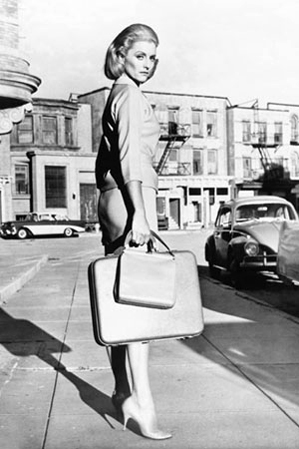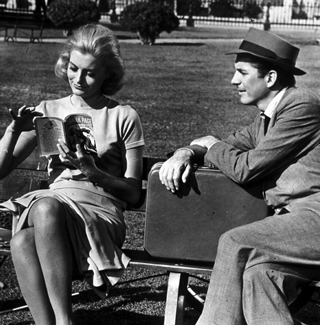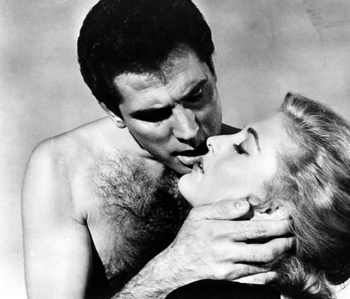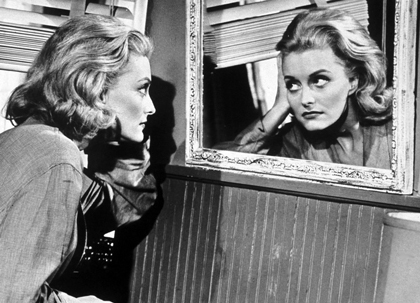
 |
|
|
|
Sam Fuller's The Naked Kiss is his last movie before becoming a wandering filmmaker forever in search of an amenable producer. Shot in conjunction with Shock Corridor, the low-budget thriller uses most of the same production personnel and the same leading lady, Constance Towers. Perhaps less experimental than its co-feature, The Naked Kiss nevertheless earns top marks with film critics and lovers of untamed, culturally subversive filmmaking. Nobody goes near the film in print without extolling its bravura opening sequence -- a series of subjective handheld shots of a bald prostitute beating her pimp into unconsciousness. The graphic image of the woman hovering over the man, going through his pockets, is one of cinema's purest expressions of the pulp fiction ethos. Fuller said that his story was inspired by a prostitute he met while working as a reporter in New York. Call girl Kelly (Towers) revolts against her thieving procurer and leaves the city for the small town of Grantville. Her plan it to set herself up as an independent, but her first and last customer is Captain Griff of the local police (Anthony Eisley). Griff recommends Kelly to the madam Candy (Virginia Grey), who runs a brothel on the bad side of the river and can always use an extra "bon-bon". Kelly instead turns over a new leaf, inspired by the trust shown by her landlady. Working in a ward for crippled children, she blossoms into a new woman, charming the kids and keeping other young nurses like Buff (Marie Devereaux of The Stranglers of Bombay) from repeating her mistakes. Kelly is approached by J.L. Grant (Michael Dante), the owner of most everything in town, and a romance begins. She's impressed by Grant's refinement and appreciation of art. He proposes, and to Kelly's surprise, doesn't withdraw his offer when she reveals her sordid background. Everything is working out wonderfully, but there's still one flaw: Kelly has an intuition about Grant's kiss, which just seems "wrong" to her ... 
Samuel Fuller is a story man -- he loved stories, breathed stories and could rescue any problem plot with an original idea. Peter Bogdanovich said that Fuller helped him get Targets into narrative shape, and other young directors have reported being dazzled by the veteran director's fast-talking ease with story construction. The Naked Kiss is a prime example of Fuller's exaggerated, near hysterical style. He consistently chooses extreme contrasts and wild overstatement over realism. Kelly is his idea of a woman: she's either a pro hooker or a liberated maternal goddess, with no space in between. As a call girl Kelly is actually rather masculine, with a tough line of dialogue and a violent disposition. The visual of her without hair makes an anti-feminine statement as well. That creature attacking the pimp might as well be an insect. But as the "good woman", Kelly shows refinement and poise. The head nurse (Patsy Kelly) hires her without references or experience, because "She was born to handle children with crutches and babies in braces." Kelly loves babies even though she cannot have one of her own. The other nurses' aides adore her. As a female who knows the ropes, Kelly defends her more vulnerable younger sisters. She talks Buff out of becoming a "bon bon" and gives Dusty (Karen Conrad) money to have her illegitimate baby instead of an abortion. Fuller idealizes Kelly with a mawkish sing-along scene. Several cute kids pretending to need their crutches get big close-ups; Fuller's treatment of this material is just as false as similar scenes in high-budget women's films like With a Song in My Heart, An Affair to Remember and Interrupted Melody. Other authorial quirks include a dress dummy displaying the uniform a fallen soldier from The Big Red One, Fuller's WW2 unit. One of the nurses "adopted" by Kelly clutches a photo of her daddy in uniform, crying because she might shame his memory. The photo appears to be a snapshot of Fuller himself. 
Fuller's hardboiled characters rub elbows with unlikely weirdos of his own invention. Fuller accepts a policeman who "upholds the law" while allowing big-time vice to flourish as long as it's kept under control. The suave bachelor J.L. Grant, every woman's dream husband, turns out to be a complete fraud, a horrible monster directly opposed to Kelly's instincts to protect children. Grant is the extreme example of the intellectual as villain: he's cultured in English poets, Italian opera and Beethoven. But we can tell there's something sick about Grant the moment we see him, and no "Naked Kiss" test is necessary. Sure enough, the nastiest of nasties is a high-toned elitist: aestheticism = decadence = perversion. Writer-director Fuller certainly takes on content rarely confronted in American films of 1964, and he gets an A+ for his frankness. But does he handle any of this well? A great deal of The Naked Kiss is awkward and unconvincing, especially the frequently terrible dialogue. The faux-hardboiled tough talk exchanged by Griff and Kelly, as well as the brothel slang bandied about in Candy's club, are laughable. But there are also very good scenes. Kelly describes the life of a prostitute to Buff at midnight, in a very effective speech: "...you'll meet men you live on... and men who live on you. And those are the only men you'll meet. And, after a steady grind of making every john feel at home, you'll become a block of ice." Also nicely understated is a moment between Griff and Kelly in an empty classroom. Fuller drops the purple prose to tell Griff that she isn't marrying Grant under false pretenses, and that Grant knows all about her. The scene benefits from impressive lighting from cinematographer Stanley Cortez, whose work brings many of the film's threadbare sets to life. 
Fuller's penchant for emphasizing emotions over credibility surfaces when Kelly is arrested for murder. Confronted with a small girl who could provide her with an alibi, Kelly immediately shakes the girl and shouts at her, and has to be told by Griff that a more gentle approach is needed. And Kelly is supposed to be a natural, nurturing mother type? When Kelly's story is corroborated, we don't understand why she should be set free ... she still killed a man, a punishable offense even if the provocation was extreme. I guess Fuller feels that an "emotional woman" always needs to be forgiven. Besides Constance Towers, who once again delivers a forceful lead performance, many of Fuller's players are weak. Michael Dante doesn't convey the air of a wealthy man, while Anthony Eisley is completely without charm as the cynical cop who apparently samples every stray female who wanders into town, before taking them to Candy's place. Old-time favorite Patsy Kelly has little to do, and later Russ Meyer spouse Edy Williams can't read a line convincingly. Both Karen Conrad and Marie Devereaux fare much better. The Naked Kiss is a good part for Ms. Devereaux. Known as a Hammer actress, she was once quite bitter about being given few opportunities to do much more than decorate scenes in revealing costumes. According to the IMDB, this was her last film. The Naked Kiss is a crazy picture, the director's usual mix of daring, vulgarity and overstatement. It's the work of an artist unconcerned with what other movies look or sound like, which is definitely something to be applauded. I'd say that it's a movie for refined cinematic tastes, but that runs the risk of stereotyping, Fulller style: refinement = decadence = perversion! 
Criterion's DVD Blu-ray of The Naked Kiss is an impressively sharp, properly matted widescreen presentation of Samuel Fuller's garish small-town exposé. The disc design is dominated by Daniel Clowes' distinctive Illustrations. The Criterion Collection lays on the extras. As with the companion HD release of Shock Corridor, Constance Towers appears in a lengthy new interview, candidly talking about her role, Fuller's directorial style and other anecdotes from the production. An original trailer is included. It's un-matted at 1:37, which allows a framing and composition comparison with the transfer of the main feature. Notice that the text blocks ride a little high in the frame -- The Naked Kiss was meant for widescreen projection between 1:66 and 1:85, with the frame scanned a little higher than dead center. The standard reasoning for this is that it's cheaper not to build sets an extra five feet higher, just to "protect" for image area that will be cropped away everywhere but on television. The other extras are excerpts from three separate French television shows on the director, from 1967, 1983 and 1987. There's a great deal of repetition in Fuller's memories of newspaper work in 1920s New York, and we want to cough while watching him smoke his cigars. But he's excellent company and has an infectious laugh. And it can't be stressed enough that once we've met Sam "in person", his movies are much easier to understand. 1
On a scale of Excellent, Good, Fair, and Poor,
The Naked Kiss Blu-ray rates:
Footnotes:
1. I can't say that I know what Mr. Fuller was like from personal experience. I only remember watching him play the "Officer in charge of Interceptor Command" on the set of 1941. Fuller was all business. He stood still, puffed on his cigar and belted out his lines dozens of times for Steven Spielberg's camera. And then he went home!
Reviews on the Savant main site have additional credits information and are often updated and annotated with reader input and graphics. Also, don't forget the 2010 Savant Wish List. T'was Ever Thus.
Review Staff | About DVD Talk | Newsletter Subscribe | Join DVD Talk Forum |
| ||||||||||||||||||